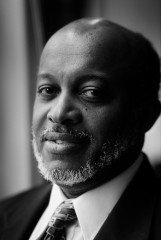New Member Spotlight: Earl Smith on Concussion Care for Victims of Domestic Violence
“Conceptualizing health care, especially in the emergency department, as a site of primary intervention in intimate partner violence would save lives and improve the health and well-being of all communities across the U.S.” - Earl Smith, University of Delaware
For this month’s new member spotlight, SSN is excited to highlight Professor Earl Smith whose work on the intersection of domestic violence and concussion care sheds light on an issue that has long been overlooked. For his membership contribution, Smith wrote an insightful and personal OpEd featured in STATNews connecting his experience as a football “guest coach” at Wake Forest University with his time as a volunteer in an emergency room.
As a guest coach for the university's Division I football team in the early 2000s, Smith was often right on the sidelines for home games where he witnessed firsthand the high-quality concussion care given to injured players. Around the same time, Smith began a three-year volunteer position at a busy emergency department and quickly noticed that women coming in with head injuries were not being screened for domestic violence.
Coincidentally, Smith had just begun research into intimate partner violence at the time. As he began interviewing domestic violence survivors, Smith heard from women who were beaten so badly by their partners that they lost consciousness, a possible sign of serious brain injury. At the time, very little research had been done linking concussions and domestic violence.
Following up on the research he began in the early 2000s, in 2022, Smith began researching how Black and Hispanic women’s experiences with intimate partner violence are affected by the barriers they face when seeking help. In his interviews with women who sustained head injuries or were strangled as a result of domestic violence, he found not one of them reported that they were examined in the emergency room for possible head injuries or diagnosed with a concussion.
In his research, Smith discovered that this unequal care of domestic violence victims centers around physicians:
“Most physicians lack the training to conduct the screening for exposure to violence. They had no idea what to do if someone screened positive. And they didn’t see it as an essential part of their job. In short, they made it clear that there are too many other tasks per shift to take care of, including treating life-threatening medical conditions.”
Based on this research and his personal experiences, Smith closes the OpEd by recommending that we must, “train all health care professionals to screen for domestic violence in its many forms, including concussion and strangulation.”
After the publication of his OpEd, Smith received numerous messages of gratitude from individuals who had a personal connection to his piece. In addition, Smith heard from the Central Arizona Center for Therapy and Imagery Services (CACTIS) Foundation, a community-based clinic in Arizona focused on diagnosing, treating and preventing concussions of young athletes and victims of domestic violence, among others. As a result, Smith is now in the process of working with the clinic on a research collaboration.
Following Smith’s connection with the clinic, he was also introduced to medical personnel at the University of Delaware who aid victims of domestic violence. Smith is now working with the group to gather prevalence data on concussions among survivors of domestic violence. He is also planning site visits to Stony Brook University in New York where they have conducted similar research in domestic violence shelters.
Thanks to the publication of his OpEd, Smith has been in touch with a range of practitioners eager to connect with him and his research. With hopes that the findings of this new research can one day influence policy decisions, Smith is confident and excited to see where these collaborations will take him.

Earl Smith is a Professor at the University of Delaware. His teachings and research focus on the sociology of sport, social stratification, criminal justice, and race. Smith also teaches courses on social stratification, race and ethnicity, social problems, race and gender, and sexuality and sports.